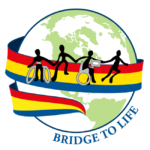
Our Mission
The Bridge School is a non-profit organization whose mission is to ensure that individuals with severe speech and physical impairments achieve full participation in their communities through the use of augmentative & alternative means of communication (AAC) and assistive technology (AT) applications and through the development, implementation and dissemination of innovative life-long educational strategies. The Bridge School is an internationally recognized leader in the education of children who use augmentative and alternative communication and has developed unique programs and trained highly skilled professionals in the use of state of the art assistive technology.
Our Beliefs
Our organization was founded and its mission established on the beliefs that:
- Everyone should have the opportunity to achieve his or her maximal potential.
- Everyone should have the opportunity to share knowledge, express feelings and be heard.
- Everyone should actively participate in his or her own learning.
- All children should have access to a quality education that encompasses a broad base of knowledge and experiences.
- Children, families, and educators must work in partnership to effectively support learning.
- Everyone should have access to a holistic communication system and technology is a tool that can enhance the communication and learning process.


